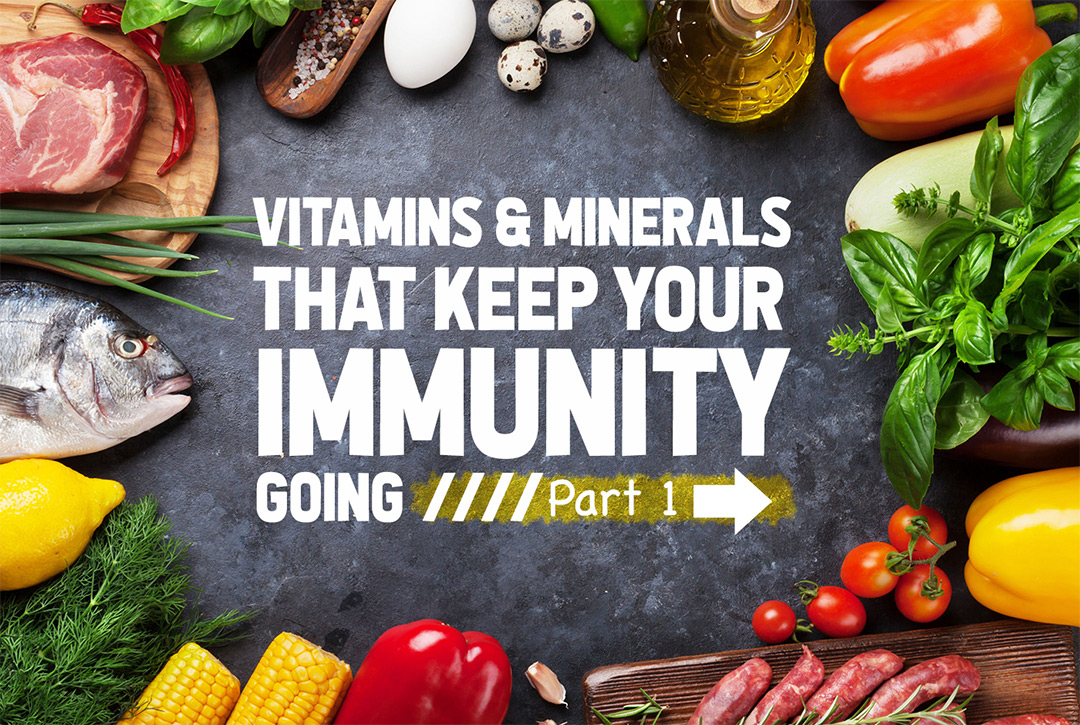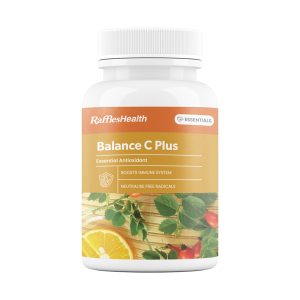Vitamins and Minerals that Keep Your Immunity Going (I)

Our immune system is one of the keys to staying well and what you feed it plays a vital role. This complex system is made up of a vast network of cells, tissues, and organs that protect us against any diseases and help us recover from injuries. When your immune system is compromised, this can leave you open and vulnerable to illnesses and infections. This is why building your immunity is important to keep your body healthy.
In this article, let’s talk about 3 vitamins that you may include in your diet to build and maintain your immune system.

This is one of the most commonly known vitamins for immune system that we can easily get through our diet, usually from citrus fruits and green vegetables. Vitamin C is essential as it helps to heal wounds and maintain healthy bones, teeth, cartilage, and skin. Research have also shown that sufficient vitamin C do help to reduce the risk of chronic diseases, heart risks and arthritis. While there are no scientific proof that vitamin C can prevent common cold, it does seem to help reduce the severity of the symptoms with faster recovery time.
The recommended dosage of vitamin C daily for adults is:
|
Food that are rich in vitamin C:
|
Tips: Heat may reduce the amount of vitamin C in fruits and vegetables. To lose the least vitamin C, steaming or microwaving is recommended instead.
Fun fact: Do you know that vitamin C also helps the body to better absorb non-heme iron (i.e spinach, beans, cereal, raisins, oats, etc). Add in some citrus fruits in your cereal for a powerpack breakfast.
Suggested products:

Vitamin E is an antioxidant that is known to protect cells from damage caused by unstable molecules called the free radicals. Free radicals are produced when your body breaks down food or is exposed to tobacco smoke and radiation. Studies have also shown that Vitamin E helps to slow down the aging process of cells. Hence, having sufficient vitamin E in your body is essential in maintaining a healthy immune system, especially among older people.
The recommended dosage of vitamin E for adults, both male and female, is 15mg daily and 19mg for women who are breastfeeding.
Food that are rich in vitamin E:
|
|
Tips: Oxidative stress is when there is an imbalance of free radicals and antioxidant in the body. Oxidative stress contributes to aging, diabetes, high blood pressure and other inflammatory conditions. Vitamin E when taken together with vitamin C, absorbs better and might works synergistically to reduce oxidative stress in the body.
Fun fact: Vitamin E is beneficial in reducing UV damage to the skin and is also an excellent moisturiser for dry and patchy areas of your skin.

Vitamin D is sometimes called the “sunshine vitamin” because it is produced in your body when exposed to sunlight. Recent studies have shown that vitamin D has a lot more benefits to our own body than we know it. The primary role of vitamin D is to regulate the absorption of calcium and phosphorus and facilitate the functions of our immune system. In another words, vitamin D helps to build strong bones and teeth and improves resistance against certain diseases. Additional research have also shown that Vitamin D help in the following:
|
|
While the UVB (ultraviolet radiation B) rays from the sun help your body to produce the necessary vitamin D, this love affair is sadly not a two-way street. Due to the presence of harmful UV rays in the sun as well, over exposure may end up causing your body more harm than good. In addition, as much as our own body is able to produce vitamin D, sometimes we may also not get the adequate amount of vitamin D because of factors such as air pollution and skin type. This is where supplements and diet comes into play.
According to the Singapore’s Health Promotion Board (HPB), the recommended daily allowance for Singaporean adults both male and female for vitamin D is 2.5mcg/day and pregnant and lactating women is 10mcg. Nonetheless, other countries might recommend 10-20mcg/day depending on your health status and amount of sunlight exposure. Excessive vitamin D can be harmful and the daily upper limit for adults is 100mcg (4000 IU).
Food that are rich in vitamin D:
|
|
Tips: Adding Vitamin D supplements to your diet may support in weight loss. Taking calcium supplements along with vitamin D may create an appetite-supressing effect.
Fun fact: Contrary to its name, vitamin D is actually not a vitamin. Vitamins are nutrients that your body cannot make. However, the human body is able to produce vitamin D because it is a prohormone, precursor of a hormone; a reactor when exposed to sunlight.
Suggested products:
Maintaining a healthy immune system is not a one-time decision and is dependent on keeping a balanced mix of good dietary and lifestyle practices. Understanding what is good for your body may help you make healthier choices. Beside vitamins, there are other nutrients that may contribute in cultivating your immune system. Before you take off to a grocery store or start on your meal planning, do read the second part of the article, Vitamins and Minerals that Keeps Your Immunity Going (II), to find out what other minerals and nutriment that keeps your immunity in good shape.
*Please note that some supplements may not be appropriate for people who are taking certain medication or experiencing certain health conditions. Do always check with your healthcare provider before embarking on any supplement plans if you are in doubt.
Article reviewed by Ms Bibi Chia, Principal Dietitian, Raffles Medical.
Images are for illustration purposes only


















